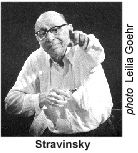|
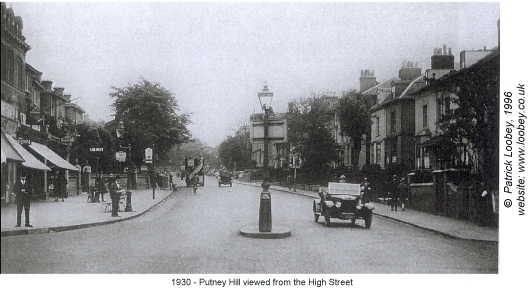
| 1930 |
b. Putney (London), 19 September. Son of Mary Hicklin
(née Drew) and Reginald Hicklin, who is currently employed in the Berlin
office of Lintas. D in Berlin from November 1930 until his return to Putney in
the last week of April 1931.
|
| 1932 |
July: Mary Hicklin petitions for divorce. The
suit is undefended. Reverting to her maiden name, she is temporarily based at
Ivy House, the riverside home in Barnes acquired by her late father, a Richmond
Estate Agent.
|
| 1933 |
M.H. marries the Campbeltown-born and Edinburgh-trained
solicitor, Charles Mactaggart, now senior partner in the long-established
Campbeltown firm of C. & D. Mactaggart, Solicitors.
Campbeltown in the early 1930's is by no means immune to
the effects of the world-wide depression, and there will be no recovery until
World War 2 , when the authorities recognise the advantages of a superb natural
harbour with access to the Irish Sea and the North Atlantic, and ample space
near Machrihanish for a large airport (later to become a major NATO asset). In
the early 1930s the local economy is based on herring fishing (the fleet is one
of the largest on the West Coast of Scotland) and dairy farming. The whisky
boom, which at its peak had supported some twenty local distilleries, is long
past, and the open-cast coal mines at Machrihanish - eighty miles from the
nearest mainline railhead - rely upon local trade, and coal boats (the
legendary 'Puffers') from Campbeltown to the Clyde coast. Until its closure in
1931, the Campbeltown & Machrihanish Light Railway Co. ran a passenger and
a freight service from the weigh-house at the head of the Old Quay.
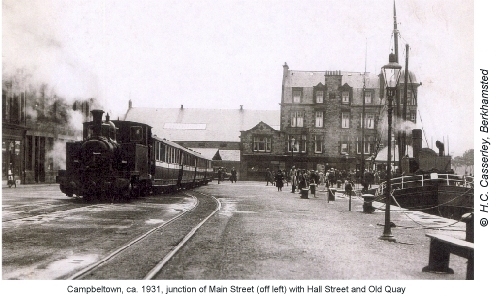
|
| 1933 |
D's new childhood home - in due course
also to become the home of his younger sister and her brother - faces south
across Campbeltown Loch, and is a short walk from the town centre and the Old
Quay. |
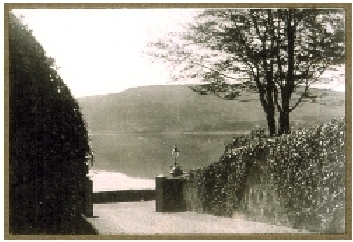 |
| 1935 |
Photo (right) showing Campbeltown Loch from the entrance to
Charles and Mary Mactaggart's home - a view that is theirs, unchanged, for
exactly half a century (they move to Edinburgh in 1983).
|
| 1935 |
World politics: Stalin's show trials continue in Moscow (January);
Hitler announces the 'Nuremburg laws' (15 September); Mussolini invades
Ethiopia (28 October).
|
| 1937 |
D is prepared for his school entry exam by a
medical student and general tutor from Hawick, Rory Hamilton, who awakens his
interest in current affairs by helping him map the progress of the Spanish
Civil War, week by week, in colour.
|
| 1938 |
September: begins school in Yorkshire.
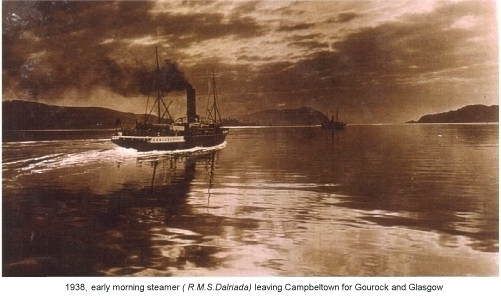
|
| 1938-43 |
First piano lessons (1939); first meeting (1942) with a
professional composer (and a considerable though now forgotten one) - Geoffrey
Bowyer. Two remarkable teachers of English: the poet Patric Dickinson (returned
wounded from active service) and Lyford Pike, who requires his pupils to write
an essay on Beethoven's Fifth, and learn by heart a poem by Carl Sandburg - the
latter considered by some to be cause for official complaint (which is duly
registered). The silence of Yorkshire nights is occasionally disturbed by the
rumble of German planes heading for the Clydeside or straggling back. A senior
master morosely declares that the ultimate victor and the major world power
will be the Soviet Union.
|
| 1943-48 |
School in Harrow (Middlesex).
|
| 1943-44 |
Some lessons in the random objectivity of missile and
rocket attacks on London and the Home Counties.
|
| 1945 |
Oboe as second instrument.
|
| 1946 |
The past year's harmony exercises (Macpherson!) are at
last alleviated by strict counterpoint in the Palestrina style (the Alan Bush
primer).
|
| 1947-54 |
Copious attempts at composition (settings of modern
poetry and prose including Sandburg, Logan Pearsall Smith, Adelaide Crapsey,
Edward Thomas; piano pieces; a fragment for cello, percussion and piano;
incidental music).
|
| 1947 |
30 March: Hears Ansermet conduct the British
premiere (BBC broadcast, introduced by Lennox Berkeley) of Stravinsky's
Symphony in Three Movements, and is overwhelmed. (Had begun collecting
Stravinsky's pre-war recordings on the Columbia label when a specialist shop
opened in Newport Street in 1946.) D's classics teacher, E.V.C. Plumptre, is a
gifted musician, and together with his housemaster Lance Gorse (a scientist,
recently ordained), becomes an important musical friend and mentor. Gorse
introduces D to the music of Sibelius and Hugo Wolf (whole albums from his
large record collection), and views his interest in composition and in
contemporary music with friendly tolerance. The performance at a school concert
conducted by Henry Havergal of Britten's Les Illuminations, with Sophie
Wyss as soloist, proves a key event. Meanwhile, Plumptre, a gifted cellist
active in the chamber music society and in the school orchestra, is a keen
supporter of D's interest in contemporary music and takes him to the first
postwar performance in the UK of Pierrot Lunaire, directed from the
piano by Peter Stadlen. The newly published full score of Stravinsky's
Symphony of Psalms, and the two-piano arrangement of Schoenberg's Piano
Concerto, are among the gifts from Plumptre which will still have a special
place in D's music library more than half a century later.
|
| 1948 |
Hears a BBC broadcast of the symphonic suite from
Roberto Gerhard's Don Quixote; while visiting Cambridge
University for entry-exam purposes, introduces himself to the Spanish-born
composer (and former Schoenberg pupil) at his Cambridge home.
During his last year at school D
absents himself permanently from geography classes after an exchange of views
with the teacher, and is allowed by Gorse to make up the time with extra music
lessons. His piano-teacher is so censorious about the volume of Bartók's
Microcosmos which he has asked to study, and so insistent that the only
'foreign' composer of the day worth taking seriously is Ernest Bloch, that he
walks out and asks the head of music to find him another piano teacher. To his
delight he is assigned to Ronald Smith, then a composer as much as a (virtuoso)
pianist, and easily diverted from the lamentable inadequacies of his pupil to
the much more fertile ground of contemporary music and his own work-in-progress
(a tone poem and a violin concerto). In the third and fourth years of Attlee's
Labour Government, long-dormant political interests are awakened by Henry
Lillingston and Herbert Harris (both brilliant and unorthodox teachers in their
respective disciplines of History and English), and by Richard Crossman, an
impressive guest speaker in the school's most prestigious lecture series.
Leaves school at the end of the summer term. Plumptre attends the first Summer
School in Music at Bryanston (director, William Glock) and returns with
a vivid account of the terrors of attempting to write fugues for Hindemith.
|
| 1949-50 |
National Service. Three months infantry training
in Kent; three months at the Education Corps centre near Bodmin; posted, with
rank of Acting Sergeant, to the Headquarters of the RASC (Royal Army Service
Corps) at Blackdown.
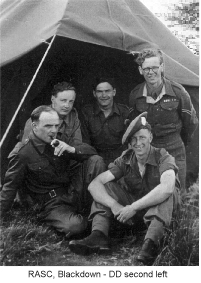
On
detachment from Bodmin and temporarily billeted at a country house near
Devizes, listens to the recently released recording of Vaughan Williams's D
major Symphony, and discovers a second modern British composer (see 1947) in
whose music he will retain a lifelong interest (Elgar will follow in due
course). Through Ravel rather than Debussy (a later discovery), has already
reached back to Satie and collected much of his music. Together with Hans
Seelig, a fellow serviceman and budding composer, mounts a Satie concert at the
Bodmin camp. Concert poster designed and executed by David Gentleman.
|
| |
|
|
